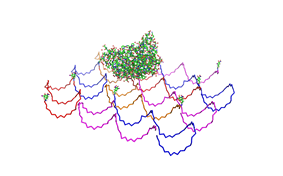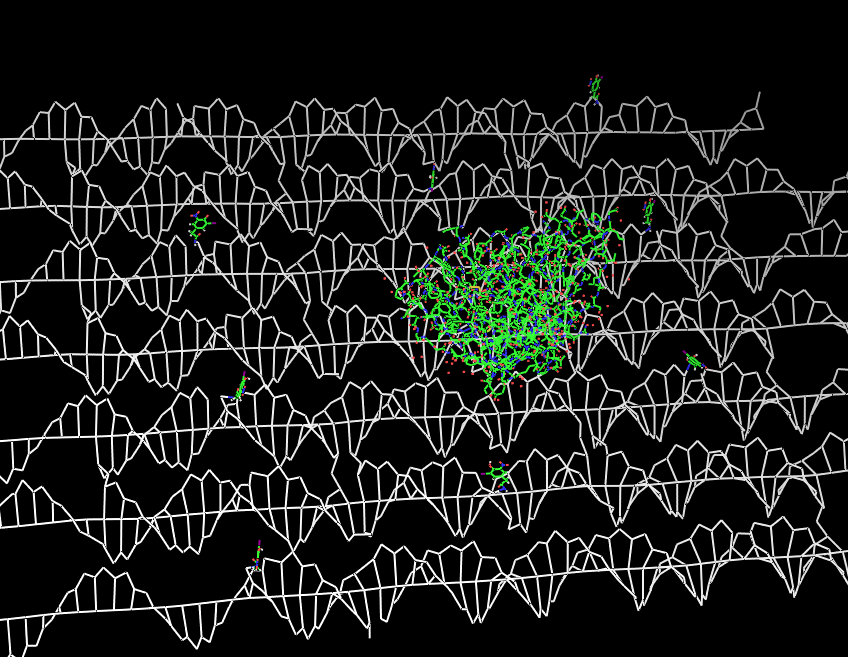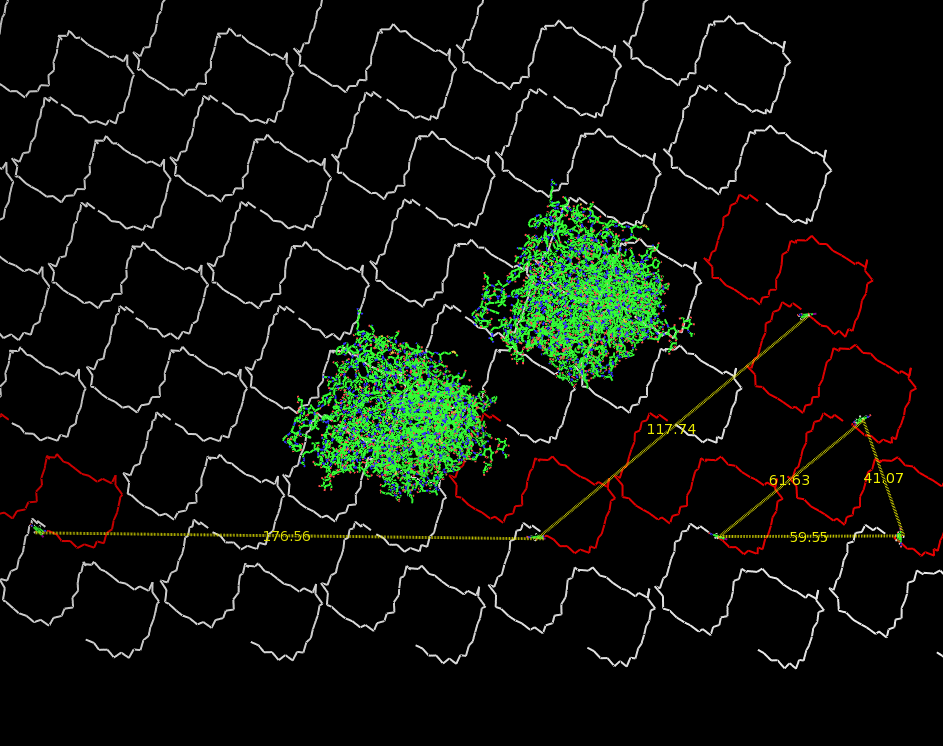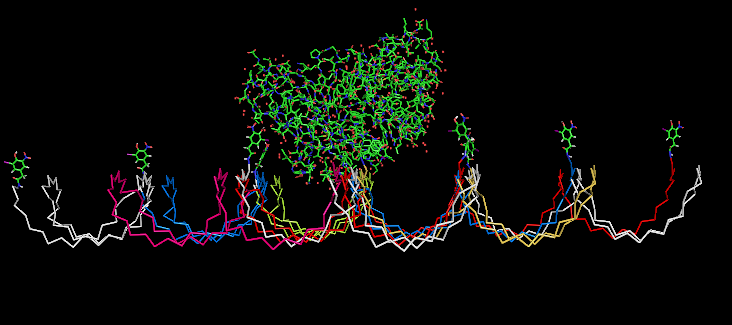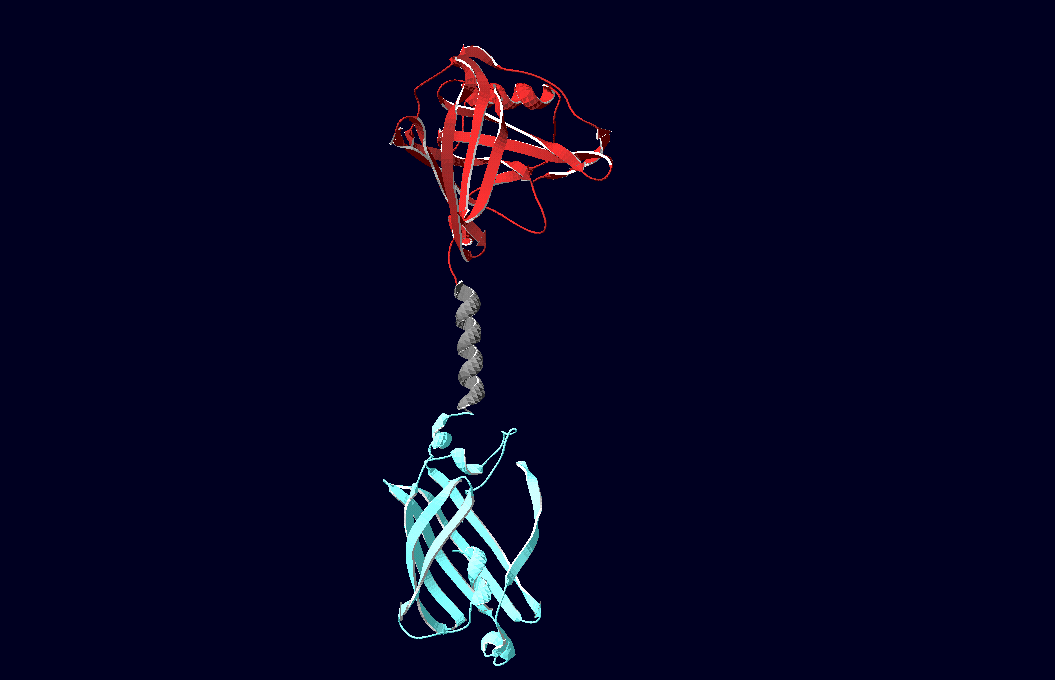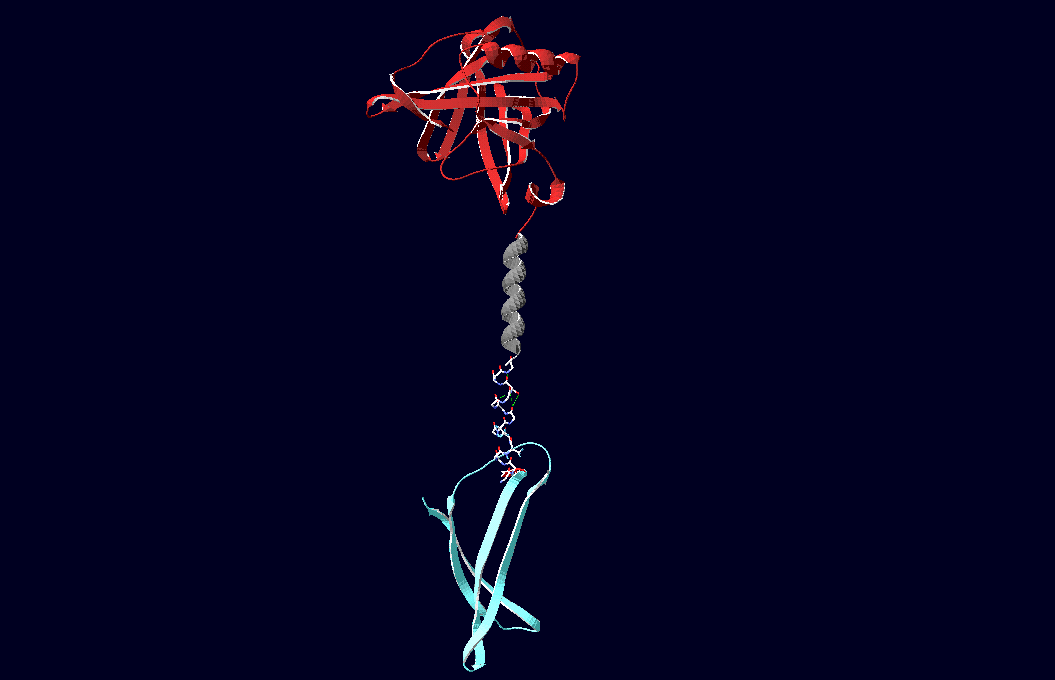Team:Freiburg/3D-Modeling
From 2008.igem.org
(Difference between revisions)
m |
|||
| (34 intermediate revisions not shown) | |||
| Line 5: | Line 5: | ||
<br><br> | <br><br> | ||
== DNA-Origami == | == DNA-Origami == | ||
| - | Planning the input pattern on the DNA-Origami surface, we generated various 3D-models of the huge molecule using | + | Planning the input pattern on the DNA-Origami surface, we generated various 3D-models of the huge molecule using [http://www.nanoengineer-1.com/content/ NanoEngineer], [http://pymol.sourceforge.net/ Pymol] and [http://spdbv.vital-it.ch/ SwissPdbViewer] (both freeware). Some of those models are shown here to give you an impression of the molecules we have engineered this year.<br> |
| - | [[Image:Freiburg2008_Fab_on_Origami_animated.gif|800 px | + | <table> |
| - | '''Fig.1:'''Some of the | + | <tr> |
| - | [[Image:Freiburg08_DNA-NIP.png|thumb| | + | <td> |
| - | < | + | [[Image:Freiburg2008_Fab_on_Origami_animated.gif|left|thumb|800 px|'''Fig.1:''' Some of the oligonucleotides that shape the single-stranded template fused to NIP-molecules and an anti-NIP-Fv-Fragment]] |
| - | [[Image:Freiburg08_DNA- | + | </td> |
| - | '''Fig. | + | <td> |
| + | </td> | ||
| + | </tr> | ||
| + | </table> | ||
| + | <br> | ||
| + | <table> | ||
| + | <tr> | ||
| + | <td> | ||
| + | [[Image:Freiburg08_DNA-NIP.png|thumb|left|375 px|'''Fig.2:''' DNA-Origami with NIP-molecules and anti-NIP-fragment]] | ||
| + | </td> | ||
| + | <td> | ||
| + | [[Image:Freiburg08_DNA-NIP5.png|thumb|left|375 px|'''Fig.3:''' Oligo-pattern with scale and two fragments (distance estimation model, distances given in Ångstrom)]] | ||
| + | </td> | ||
| + | </tr> | ||
| + | </table> | ||
| + | <table> | ||
| + | <tr> | ||
| + | <td> | ||
| + | [[Image:Freiburg08_DNA-NIP8.png|thumb|left|780 px|'''Fig.4:''' Oligo-pattern with scale and two T-Cell-receptors (distance estimation model, distances given in Ångstrom)]] | ||
| + | </td> | ||
| + | </tr> | ||
| + | </table> | ||
| + | <br> | ||
| + | <table> | ||
| + | <tr> | ||
| + | <td> | ||
| + | [[Image:Freiburg08_DNA-NIP3.png|thumb|left|800 px|'''Fig.5:''' Oligo-pattern with NIP-molecules and Fab-fragment, binding accessibility estimation model]]<br> | ||
| + | </td> | ||
| + | </tr> | ||
| + | </table> | ||
== Fusion Proteins == | == Fusion Proteins == | ||
| - | The pictures below show models of the fusion proteins our composite parts Bba_K157032 and Bba_K157033 code for (generated with "SwissPdbViewer"):<br> | + | The pictures below show models of the fusion proteins of our composite parts [http://partsregistry.org/wiki/index.php?title=Part:BBa_K157032 Bba_K157032] and [http://partsregistry.org/wiki/index.php?title=Part:BBa_K157033 Bba_K157033] code for (generated with "SwissPdbViewer"):<br> |
| - | [[Image:Team-Freiburg2008_Lipo_alpha_nCFP.png|400 px]][[Image:Team-Freiburg2008_Lipo_alpha_link_cCFP.png|400 px]] | + | [[Image:Team-Freiburg2008_Lipo_alpha_nCFP.png|400 px]][[Image:Team-Freiburg2008_Lipo_alpha_link_cCFP.png|400 px]]<br> |
| - | '''Fig. | + | '''Fig.6: Red:''' LipocalinFluA, '''Grey:''' "Transmembrane region (BCR, no structural data; symbolized by helix), '''Blue:''' '''left:''' Split-Cerulean (CFP), N-terminal fragment; '''right:''' Split-Cerulean (CFP), C-terminal fragment<br> |
| + | Following pdb-files have been used to generate the models: | ||
| + | Cerulean-CFP: 2Q57<br> | ||
| + | Venus-YFP: 1MYW<br> | ||
| + | Engineered Lipocalin: 1n0s<br> | ||
| + | B1-8 Fv-Fragment:1a6w<br> | ||
}} | }} | ||
Latest revision as of 02:40, 30 October 2008
 "
"

